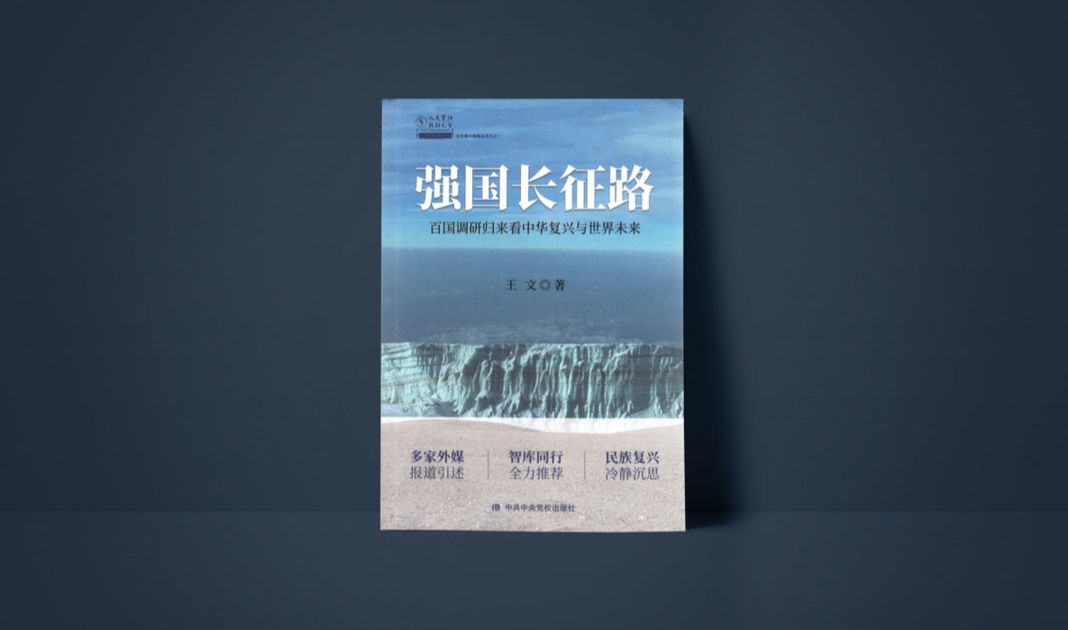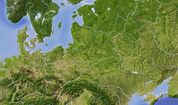We don’t want war, but we’re not afraid of it

“The Long March of the Strong State” (photo: author)
In effect, we rarely ever see what is really happening in China, what the discourse and what the temperature of the debate there is, and thus, as a result, we just do not know what kind of mental topography is hidden behind it.
Meanwhile, in China, understood here as continental China, i.e. the People’s Republic of China (PRC), a completely new generation of experts and analysts has appeared, speaking – worse or better – English, who know Western literature and the external world, were often educated in the West, and yet have their own views, most often resulting from pride in what China has achieved in the last four decades of reforms. They are polite, well-educated, and at the same time confident, performing the role of spokespersons of the newly rising, or rather, rejuvenating power. They are around 40 years old or not much more, but they do not hesitate to speak – at home or even abroad.
The New Long March
One of them is Wang Wen, for years a journalist at the now-influential and sharp-in-its-views newspaper Huanqiu Shibao, better known abroad for its English version, the Global Times. To this day, he is one of the columnists specialising in the international scene and globalisation (e.g. http://www.globaltimes.cn/content/1151202.shtml). Since 2013, he is a professor and Executive Dean at the Institute of Financial Studies of the Renmin University in Beijing, and he also performs several other distinguished functions, including those regarding the promotion of the Silk Road concept and people-to-people relations with the USA.
He is not yet so well known in China as his direct mentor from Renmin and probably the main exponent and defender of the Silk Road vision, Wang Yiwei, or the Global Times Editor-in-Chief, Hu Xijin, who is known for his sharp anti-Western philippics. And, of course, he is still far behind some of the real gurus of intellectual life there, like for instance Shaun Rein, not of Chinese – Han roots, but well placed in the Chinese establishment or former translator of Deng Xiaoping, Zhang Weiwei, who have much more Western experience. The first one spent many years in Brussels, the second is embedded in the world of multinational business and the latter earned a professorship at the Diplomatic Academy in Switzerland.
Both the book’s title Qiangguo Changzheng Lu (The Long March of the Strong State), as well as its subtitle and the content itself are so encoded in Chinese discourse that for external readers it would require slow decoding, and not just a direct translation of its content.
The Long March is a mythical concept in the PRC. Chinese communists went through it, with great sacrifices, fleeing thousands of kilometres from the harassing Guomindang – Chiang Kai-shek’s nationalist army.
Qiangguo is a term recently very popular and used interchangeably with Daguo. These are synonyms for the term ‘Great Power’. Even the concept of Daguo guanxì (Great Power Relations) has already been introduced into the public circulation in the PRC, which should be understood as the equivalent of Western term of power politics. In other words, the Chinese, like Donald Trump and his administration, are more in favour of political realism and the formula of the balance of power, rather than exponents of clashing value systems. They emphasise all the time, and so does the Author, that they do not intend to “export” their model or their solutions. Which, in my opinion, is the right approach, because it is a sui generis case, specific and irreplaceable outside of China with her unique cultural heritage.
The subtitle of this publication – “A look at China’s revival and the future of the world after seeing a hundred countries” – also requires explanation because, as we read in the book, the Author has already visited so many states during his frequent peregrinations (being in the US alone more than 30 times). However, the term “revival” or “renaissance”, in full form and commonly appearing as Zhonghuaminzu weida fuxing (the great ‘rejuvenation’ of the Chinese nation), is the second key phrase – along with “Chinese Dream” – of the current administration under the charismatic Xi Jinping.
Wang Wen gives the motto of the entire book of Xi Jinping’s speech on the 80th anniversary of the Long March, delivered on October 21, 2016, in which the Chinese leader appealed for loyalty (towards the CCP and the authorities), national unity, but also a strong and loyal army as conditions necessary for the success and survival of a strong China (see for example: https://www.scmp.com/news/china/policies-politics/article/2038996/loyalty-survival-and-new-long-march-xi-jinpings-speech). Xi Jinping then highlighted, which the Author exposes, that recently every generation of Chinese is going through its own Long March, and the task of the present is nothing but the fulfillment of Two Centenary Goals (Liangge yibai nian), and thus, first of all, to change the developmental model, basing it on a thriving internal market already on the centenary of the ruling Communist Party of China – the CCP, by mid-2021, and then bringing, on the centenary of the PRC (October 1, 2049) to the ‘Great Renaissance’ of all of China.
The Long War
Recently, in the spring of 2019, in the context of growing tensions and trade war with the USA, Xi Jinping returned to the idea of the Great March once again, which this author also quotes.
No wonder he [Wen] starts the whole narrative with the words “This is a war!”
He quickly adds, in the Introduction, that this is not just about trade and the economy, but also about conflicts including high-tech, education, science and finance.
In this context, importantly, the author refers to Mao Zedong’s once-famous and very well-known in China paper “On Protracted War”, delivered in late spring 1938, after the Japanese aggression against China (full text in English here: https://www.marxists.org/reference/archive/mao/selected-works/volume-2/mswv2_09.htm. Wang Wen does not quote Mao literally, because he knows perfectly well that in the PRC these words are known, but he refers to high-profile theses when the Chinese communist chief exclaimed:
“The question now is: Will China be subjugated? The answer is, No, she will not be subjugated, but will win final victory. Can China win quickly? The answer is, No, she cannot win quickly, and the War of Resistance will be a protracted war”.
Wang Wen reminds us that patience and persistence paid off, and the Chinese communists had to wait a long time for success, until 1949 when Mao and the CCP took over all power in the state. And only in this context the Author goes to the analysis of the current international scene. Like the vast majority of the most famous Chinese strategists, such as Hu Angang, Jin Canrong, Yan Xuetong, or the already mentioned Zhang Weiwei, he focuses primarily on the United States of America, its role, meaning, reading their intentions and behaviours, also in the case of the current administration of Donald Trump.
He believes and proves by statistics that the role of the US in the modern world is “relatively diminishing”, but at the same time emphasises that the US still remains the greatest power on the globe and that the world needs a “new USA, unprejudiced and tolerant.”
According to the Author, China is now facing a new Long March, and his central strategic concept is “a fight without a turning point in China-US relations.” In other words, a new type of chronic conflict is looming and one need to be prepared for it, as Mao once talked about. China is going on its separate path of modernisation and reform, thanks to which it has achieved unprecedented successes. And now she is going to stick to them once more, to even a greater extent.
In this context, the Author is quoting another key speech by Xi Jinping, delivered on December 18, 2018, in which the Chinese leader summarized the 40th anniversary of the reforms initiated by Deng Xiaoping (Full text: https://www.transcend.org/tms/2018/12/xi-jinpings-speech-on-40th-anniversary-of-chinas-reforms-opening-up-full-text/), indicating in it unprecedented achievements, but also serious challenges now facing China, requiring again a “common front” and the unity of society with those in power.
Due to the fact that this approach, combining open markets and globalisation, mixed with the market and state intervention at home, was so successful, thus China is determined to continue its own unique path. Which does not mean that it will not benefit from the experience and ideas of others.
Wang Wen quotes in this respect, among others, Alexis de Tocqueville, Francis Fukuyama, Ian Morris, Kishore Mahbubani or the recently deceased Immanuel Wallerstein. An then he repeats after Xi Jinping the latest political mantra in Beijing, according to which the further development of China is inextricably linked to the world situation. Only an open and not closed doors give a chance for success.
He is quoting also another political tune in Beijing, according to which “China will never be a revolutionary force in the international order.” This however is a thesis “for internal use”, because outside of the Middle Kingdom it is hard to believe, bearing in mind that it is precisely Mao Zedong, so strongly exposed by the Author, who introduced such a “revolutionary force” to the international scene (mostly in relation to Cambodia or Vietnam). Let us admit, however, that in the overarching relationship (the Strategic Triangle with the US and the USSR), even then, in a revolutionary fervor of the Cultural Revolution era, the PRC authorities were guided by the hard realities and by common sense.
We rely on a multi-polar world
It may be interesting for the Polish reader that among the hundred countries that the Author has already visited was also Poland (he attended the Economic Forum in Katowice). It is worth noting that among the several other growth paths, in addition to China, which he draws the reader’s attention to are: the European Union (“not going American way”), Russia, India, Brazil, South Korea, Turkey, Iran, Poland, Egypt and Indonesia.
On several pages, literally six, dedicated to Poland, the Smolensk disaster (i.e. annihilation of political elites and the President in the air catastrophe) and the partitions of the country are recalled.
There is no sharp assessment of the rules in Poland, but the context is clear: not everything in the country has functioned and functions well. On the other hand, there is a reference to the Stratford report – once famous – according to which it is Poland and Turkey that could grow into regional powers by 2050. They have such potential. However, they must follow their own path, likewise China. And the author’s sympathy for Poland is visible. Which, of course, should be understood in the context of the fact that the country has found itself on the path of the land Silk Road.
However, it is worth quoting the advice for Polish leaders formulated by Wang Wen: “the Renaissance is not only in the sphere of strategy and military, but above all through the development of culture and modernisation.” In other words, it is not the army and its new equipment, but high-technology and knowledge-based-society that are now the most important.
Although the Author has been working formally at the University for several years, he does however clearly emphasizes the role of think tanks in the development of Chinese thinking. It is indeed a new phenomenon in the PRC,which has recently been thoroughly investigated and described by an expert from the Brookings Institution, Cheng Li. Their rapid development allows them to free themselves from a strictly scientific discipline, although the Author just happens, which in this type of literature in the PRC is rare, to include footnotes and references to the works of others. However, the literature derived from this is of a temporary nature, as well as political and journalistic, and not strictly scientific in its form.
Because this volume is dedicated to “intermediate” (gan zhongxue), implicitly, maybe even to schools, Wang Wei, like a whole new generation of well-educated beneficiaries of the “reform era” of the last 40 years, is still sticking to party orthodoxy. For those who follow and know the current CCP policy, the volume may not be revealing. Who, however, knows her outside the PRC?
The basic issues addressed in the volume are, among others, slow geostrategic changes, long-term trends, significance of the slow twilight of US hegemony and the formation of new centres of power, including those mentioned above. The most interesting is the third chapter, which talks about the further management of Chinese reforms, where once again the thesis about the “three stages” of these reforms is repeated, i.e. first meaning the reconstruction of the power of the state (1978-2008), then a process of creation of the purchasing power of the citizen and the thriving internal market (undergoing now, and scheduled maybe for another 30 years), and only then will the time come for real political reforms, which, however, we can be almost certain, will not go towards the Western model.
The next chapter, which talks about “managing globalisation”, is also important, if at all possible, where, as in the whole work, the role of the Chinese Belt and Road Initiative is strongly emphasized, with special attention paid to new connections, both in terms of infrastructure and technology and between people.
The whole content is directed to the Chinese reader and immersed in the local semantics and the current discourse or party jargon. The translation itself, without any additional explanations, would help nothing from outside the reader. However, some theses, for example such that after the “period of turmoil” (1912-1949) came the “age of growth” (from 1949 to today), outside the PRC will simply arouse opposition and negation.
We are still living in two separate worlds – and it probably will stay that way. Which does not mean that we do not have to follow what is happening in China currently in intellectual terms. It is worth doing this, even if we will not, almost certainly, agree with each other. And what will their new Long March bring? Only history will judge.
From this reading comes yet another key conclusion for us: “The fifth generation of leaders, as it is officially named, led by Xi Jinping, who came to power in November 2012, broke with the strategy of modesty and low profile of Deng Xiaoping and quickly turned China’s achievements into self-confident and assertive approach towards Asia and global arena. This behaviour, however, awakened – finally – the current hegemon, the US. In 2018, the previous strategy of involvement in Chinese-American relations quickly transformed into a structural crisis and a new period – “strategic competition”, which began with an open trade and customs war.
This fact caused Chinese decision-makers and their spokespersons, such as Wang Wen, to quickly adapt to new realities. For the last four decades of transformation and reform, they have perfectly mastered adaptability. Now they have dropped their tone, they are no longer as strongly as in the past few years after 2012, but they stick to two basic formulas: “in this (trade) war, there will not be a winner”, and at the same time: “we do not want war, but we do not fear it”. The Long March was undertaken in order to wait for a proper time (and power), and at the same time for long-term strategic benefits. And now, when there is no more important issue for Beijing than a peaceful unification with Taiwan and “the final unification of Chinese lands”, current authorities are ready tactically give a way in many other aspects, but not in substance.
In this context, as can be understood (although the Author does not take up the subject, despite the fact that the Introduction was signed on July 11 this year), one should also consider the great restraint of the authorities in Beijing in relation to the demonstrations in Hong Kong, initiated on June 9 this year. Here, the “wait-it-out” approach won again, and far-reaching calculations overcame short-term burdens and image blows. However, if this strategy will ultimately bring success, it depends not only on the authorities in Beijing, but not least on the behavior of other powers, starting with the US, and the newly emerging, multipolar balance of power in the world, which Chinese authors, including Wang Wen, are paying so much attention to now.
This is because they are deeply afraid of a return to the Cold War and bipolar polarisation, which they do not want in any way, because they still have many serious issues yet to be resolved on the internal stage, where the transformation process has not come to an end, merely in terms of the above-mentioned “three stages” of reforms.
Before China lies a difficult-to-pass barrier from quantity to quality, as a prerequisite for achieving the very ambitious goal of creating an innovative society and a model based on a strong middle class. China needs calmness, and apparently it is not on the rocking international scene. Authors such as Wang Wen know it perfectly well. That is why they are advocating globalisation, free markets and open gates, not economic nationalism, protectionism and unilateralism, promoted now by the US, as they claim. Thus, it seems, a conflict continues and the tug-of-war can be a prolonged one.
Autor
Bogdan J. Góralczyk
Political scientist, sinologist, professor at the University of Warsaw, former ambassador. Author of Nowy Długi Marsz. Chiny ery Xi Jinpinga, Wydawnictwo Akademickie Dialog, Warsaw 2021 (The New Long March: China in the era of Xi Jinping).






Trwa ładowanie...